Munich 1972
Also by David Clay Large
Nazi Games: The Olympics of 1936
And the World Closed Its Doors: One Familys Abandonment to the Holocaust
Berlin
Where Ghosts Walked: Munichs Road to the Third Reich
Germans to the Front: West German Rearmament in the Adenauer Era
Contending with Hitler: Varieties of Resistance in the Third Reich (editor)
The End of the European Era: 1890 to the Present (with Felix Gilbert)
Between Two Fires: Europes Path in the 1930s
Wagnerism in European Culture and Politics (coeditor)
The Politics of Law and Order: A History of the Bavarian Einwohnerwehr, 19181921
Munich 1972
Tragedy, Terror, and Triumph at the Olympic Games
David Clay Large
Rowman & Littlefield Publishers, Inc.
Lanham Boulder New York Toronto Plymouth, UK
Published by Rowman & Littlefield Publishers, Inc.
A wholly owned subsidiary of The Rowman & Littlefield Publishing Group, Inc.
4501 Forbes Boulevard, Suite 200, Lanham, Maryland 20706
http://www.rowmanlittlefield.com
Estover Road, Plymouth PL6 7PY, United Kingdom
Distributed by NATIONAL BOOK NETWORK
Copyright 2012 by Rowman & Littlefield Publishers, Inc.
All rights reserved . No part of this book may be reproduced in any form or by any electronic or mechanical means, including information storage and retrieval systems, without written permission from the publisher, except by a reviewer who may quote passages in a review.
British Library Cataloguing in Publication Information Available
Library of Congress Cataloging-in-Publication Data
Large, David Clay.
Munich 1972 : tragedy, terror, and triumph at the Olympic Games / David Clay
Large.
p. cm.
Includes index.
ISBN 978-0-7425-6739-9 (hardback) ISBN 978-0-7425-6741-2 (electronic)
1. TerrorismGermanyMunich. 2. AthletesViolence againstGermany
Munich. 3. IsraelisViolence againstGermanyMunich. 4. Olympic Games
(20th : 1972 : Munich, Germany). 5. Munazzamat Aylul al-Aswad. I. Title.
HV6433.G32L37 2012
364.152'30943364dc23
2011036165
 The paper used in this publication meets the minimum requirements of American National Standard for Information SciencesPermanence of Paper for Printed Library Materials, ANSI/NISO Z39.48-1992.
The paper used in this publication meets the minimum requirements of American National Standard for Information SciencesPermanence of Paper for Printed Library Materials, ANSI/NISO Z39.48-1992.
Printed in the United States of America
To Howard J. De Nike
Acknowledgments
Writing a book can be rather like completing an endurance run over hilly terrain, and now, having come to the end of another long slog, I get to break out the cold beer and drink to those institutions and individuals who helped me stay the course.
Montana State University, my academic home for the past quarter century, provided a grant in support of research for this book early on. MSUs History and Philosophy Department also helped fund the procurement of photographs. Sven Riepe at Sddeutsche Zeitung Photo helped me comb through his institutions extensive collection for appropriate images. My editor at Rowman & Littlefield, Susan McEachern, encouraged this project from its inception and offered useful advice all along the way. The staffs of the various archives and libraries where I conducted my research also deserve a tip of the glass: Bayerisches Hauptstaatsarchiv, Munich; British Library, London; Bundesarchiv Berlin; Bundesarchiv Koblenz; Deutsche Sporthochschule, Cologne; Doe Library, University of California, Berkeley; Friedrich-Ebert-Stiftung, Bonn; German National Olympic Committee (NOK), Frankfurt; Hoover Institution, Stanford; Institut fr Zeitgeschichte, Munich; International Olympic Committee Archive, Lausanne; LA 84 Foundation, Los Angeles; Monacensia Library, Munich; Montana State University Library, Bozeman (especially Interlibrary Loan); National Archives, College Park; Politisches Archiv im Auswrtigen Amt, Berlin; Staatsarchiv, Munich; Stadtarchiv, Munich; Stadtbibliothek, Cologne; Sterling Library, Yale University; University of Illinois Archive (Avery Brundage Collection); Widener Library, Harvard University; and Willy-Brandt-Haus, Berlin.
I am especially grateful to colleagues and friends who consented to read over drafts of my manuscript in part or in its entirety. (Some of those pressed into service, I can well imagine, greeted this task in the spirit of Dorothy Parkers famous lament, What fresh hell is this?) My beleaguered helpmates include Andreas W. Daum, Howard De Nike, Brian Ladd, Dale Martin, Frank Rettenberg, Jonathan Schneer, Billy G. Smith, Hans R. Vaget, and Brett Walker. Lawrence Monk Terry, on oarsman on the U.S. Olympic rowing teams at Mexico City and Munich, shared his recollections of Munich 72 from the athletes point of view. Despite painstaking vetting from all the above, I am, of course, solely responsible for any inaccuracies or imbecilities that remain in the final product.
Finally, I need to thank my long-suffering wife, Margaret, who, once again, had to endure considerable surliness and bitchiness on the part of her partner during the completion of a long writing project. And many thanks also to eight-year-old Alma, who, justifiably, would have preferred that her daddy play games with her rather than write about them for others.
San Francisco, California, 2011
Munich 1972
Introduction
I am always amazed when I hear people saying that sport creates goodwill between the nations, and that if only the common peoples of the world could meet one another at football or cricket, they would have no inclination to meet on the battlefield. Even if one didnt know from concrete examples (the 1936 Olympic Games, for instance) that international sporting contests lead to orgies of hatred, one could deduce it from general principles.
George Orwell, The Sporting Spirit (1945)
A thing I never know, when Im starting out to tell a story... is how much explanation to bung in at the outset.
Bertie Wooster in P. G. Wodehouse, The Code of the Woosters (1938)
When the XX Summer Olympic Games opened on August 26, 1972, in Munich, West Germany, the host city was brimming with pride and (generally) good spirits. Visitors arriving in this beautiful Bavarian metropolis on the Isar River, with its famous museums, beer halls, and views of the nearby Alps, were struck by how earnestly the locals were working to appear laid back and charming (not, perhaps, the first adjectives that leap from the lips in connection with the word German ). For their part, the politicians and officials who had taken on the mighty task of organizing these Munich Games were doing their utmost to make everything about their show different from the Berlin Olympics of 1936, the last time an Olympic festival had taken place on German soil. Then, of course, Adolf Hitler had been in power, and the Nazi Games had helped advertise and promote the Third Reich.
The planners of the 1972 Games had good reason to worry about Nazi associations. Munich itself had been the birthplace of Nazism and the site of Hitlers first attempt to seize power, the Beer Hall Putsch of November 1923. After their most famous citizen had become Reich Chancellor in January 1933, city fathers christened Munich Capital of the [Nazi] Movement and added a swastika to the towns coat of arms. Hitler personally commissioned a new museum in Munich, the House of German Art, for the display of ideologically acceptable artwork. In 1937, Munich opened the Exhibition of Degenerate Art, a traveling display of some 650 works by artists identified with the avant-garde. Assembled by Adolf Ziegler, a Nazi arts official and hack painter known for his recumbent nudes of striking verisimilitude (which specialty earned him the sobriquet Reichsschamhaarpinsler official pubic hair painter of the Reich), the collection contained works by Max Ernst, Paul Klee, Oskar Kokoschka, Georg Grosz, and Otto Dix, to name a few. Citizens were encouraged to compare the works in this show with those in the nearby House of German Art so that they might better understand the urgency of Hitlers renewal of German culture. Munich also pioneered in the regimes program of mass incarceration and political terror: Dachau, Nazi Germanys pilot concentration camp, lay just up the road. In September 1938, Munich played host to the infamous conference between Hitler, Benito Mussolini, Neville Chamberlain, and douard Daladier that ceded the Czech Sudetenland to Germany and helped set the stage for World War II (making Munich a byword for appeasement ever after). But in 1972, twenty-seven years after the collapse of the Third Reich, Germanys second chance at hosting a summer Olympic festival would showcase a new Munich and a new (West) Germanya kinder and gentler Germany that had arisen from the ashes of Hitlers Reich. In short, Munich would put on the most carefree and happy-go-lucky Olympics in history: die heiteren Spiele (the Cheerful Games), as the catchy slogan of the day had it.
Next page
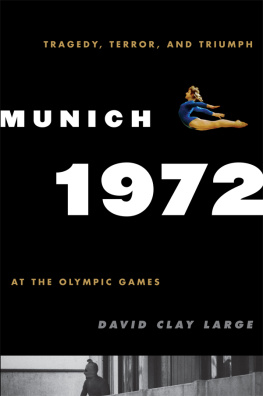


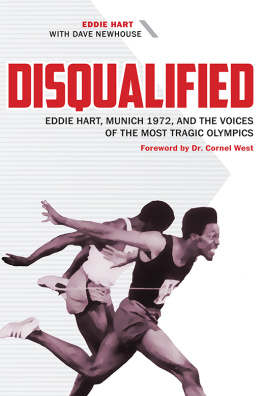
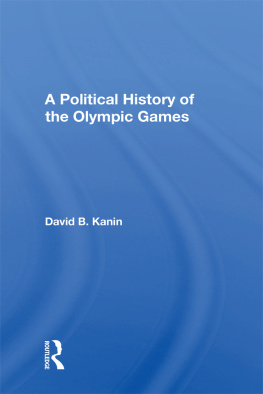

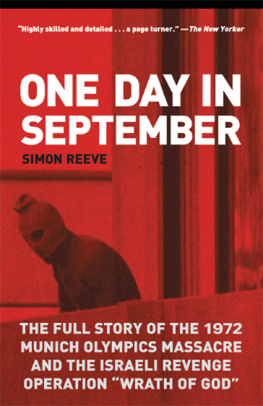
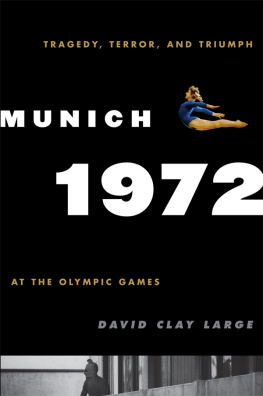
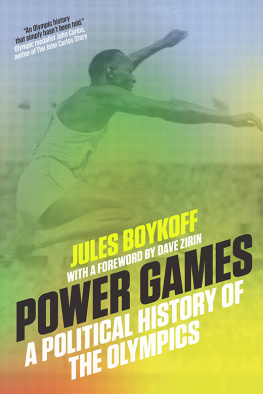
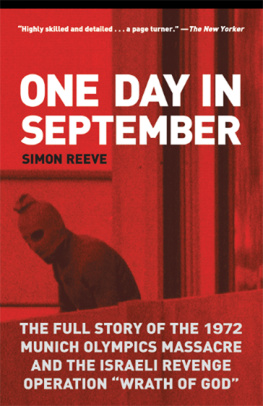
 The paper used in this publication meets the minimum requirements of American National Standard for Information SciencesPermanence of Paper for Printed Library Materials, ANSI/NISO Z39.48-1992.
The paper used in this publication meets the minimum requirements of American National Standard for Information SciencesPermanence of Paper for Printed Library Materials, ANSI/NISO Z39.48-1992.